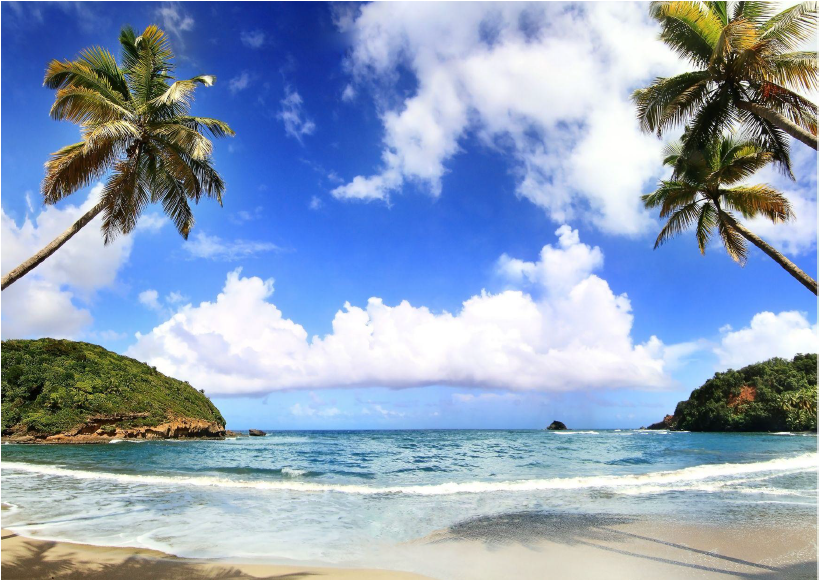Citizenship By Investment in the Caribbean
According to caribbean regional estate agents there has been a big increase in the number of people seeking citizenship by investment.
If you scroll through websites offering homes and land for sale in the Eastern Caribbean, it is no longer just enticing beaches and a solacious lifestyle being offered to attract buyers.
More and more property listings are offering a passport as well. Five of the region's island nations – Antigua and Barbuda, Dominica, Grenada, St Kitts and Nevis, and St Lucia – offer such citizenship by investment (CBI) from as little as $200,000 USD, £145,000, R$1,080,000.
Buy a home, and you also get a passport that grants the holder visa-free access to up to 150 countries including Europe's Schengen area, and for all but Dominica, to England as well.
For the wealthy, the islands' absence of taxes such as capital gains and inheritance, and in some cases on income too, is another major incentive.
And all five of the countries schemes allow buyers to retain their existing citizenship.
In Antigua, estate agents are struggling to keep up with demand. "Up to 70% of all buyers right now are wanting citizenship, and the vast majority are from the US," according to the estate agents.
"This time last year, it was all lifestyle buyers and a few CBI. Now they're all saying 'I want a house with citizenship'. The agents has never sold so many before."
Despite Antigua's programme having no residency requirement, some purchasers are looking to relocate permanently.
US citizens account for the bulk of CBI applications in the Caribbean over the past year, according to investment migration experts Henley & Partners.
Applications for Caribbean CBI programmes have increased by 12% since the fourth quarter of 2024.
Passports from the five island countries give the holder visa-free entry to most countries around the world.
"Around 10-15% actually relocate. For most it's an insurance policy against whatever they're concerned about. Having a second citizenship is a good back-up plan.
Advantages of Caribbean passports provide appeals to business people, and may also present a security benefit. "Some US clients prefer to travel on a more politically-benign passport."
Not only does being a citizen avoid restrictions on length of stay, it also gives the freedom to take advantage of business opportunities.
Still, such programmes are not without controversy. When passport sales were first introduced in 2012 by the then Antiguan government as a way of propping up the ailing economy, some considered the ethics a little dodgy.
The Caribbean's appeal as a place to live is obvious.
The European Union has threatened to withdraw its coveted visa-free access for Caribbean CBI countries, while the US has previously raised concerns over the potential for such schemes to be used as a vehicle for tax evasion and financial crime.
Dominica's Prime Minister Roosevelt Skerrit has described his country's CBI programme as "sound and transparent", adding authorities had worked hard to ensure its integrity.
The government says passport sales have raised more than $1bn since the initiative's inception in 1993, paying for vital infrastructure including a state of the art hospital.
In St Lucia, Prime Minister Philip J Pierre says the island adheres to the highest standards of security to ensure its CBI does not inadvertently aid illicit activities.
The need to raising revenue is a delicate balancing act for small Caribbean nations with meagre resources, dependent mostly on the tourism sector.
CBI programmes were labelled a lifeline at a regional industry summit in April 2025, with funds used for everything from cleaning up after natural disasters to shoring up national pension schemes. Antigua's Prime Minister Gaston Browne said money raised had brought his country back from the brink of bankruptcy over the past decade.
Aside from buying property, other routes to Caribbean citizenship through investment typically include a one-off donation to a national development fund or similar.
They range from $200,000 in Dominica for a single applicant, to $250,000 for a main applicant and up to three qualifying dependents in Dominica and St Kitts. In Antigua, investors also have the option of donating $260,000 to the University of the West Indies.
In the face of international pressure, the islands have committed to new measures to bolster oversight, including establishing a regional regulator to set standards, monitor operations and ensure compliance.
Additionally, six principles agreed with the US include enhanced due diligence, regular audits, mandatory interviews with all applicants, and the removal of a loophole that previously enabled an applicant denied by one country to apply in another.
These days, passport sales account for 10-30% of the islands' GDP.
CBI schemes is "generally well supported" as a result. "The public understand the value of it to the economy, and appreciate what the governments has been able to do with the money."
“When you invest, you are buying a day, a week, a month, a year that you don’t have to work.”
Aug / 2025– migjonela.com.br


